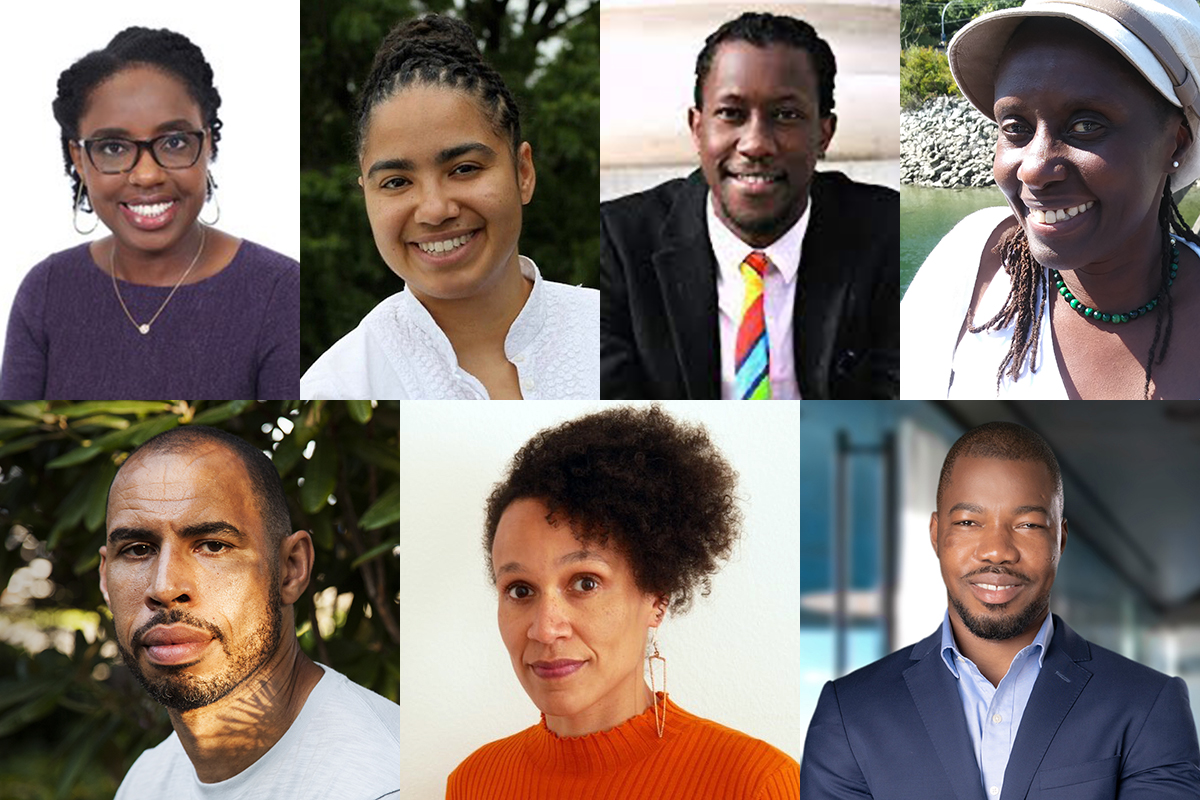Seven new faculty members join the Black Studies program
February 1, 2022
Share

The Faculty of Arts and Science is welcoming seven new faculty members to the Black Studies program, including four Queen’s National Scholars in Black Studies.
The new Queen’s National Scholars include Kesha Fevrier, Radical Black Ecologies (Geography and Planning); Joseph Kangmennaang, Black Health and Social Change (School of Kinesiology and Health Sciences); Jennifer Leath, Black Religions (School of Religion); and Daniel McNeil, Black Studies Chair (Gender Studies).
Joining them are faculty members Juliane Okot Bitek, Black Creative Writing and Cultural Production (English and Gender Studies); Dalitso Ruwe, Black Political Thought (Philosophy); and Vanessa Thompson, Black Studies Program (Gender Studies).
Their recruitment was the result of an intensive search with a focus on equity, diversity, inclusion, anti-racism, and scholarship that emphasizes global Black studies.
“The Queen’s National Scholar program attracts top talent, ensuring growth and the continuation of our efforts to advance research and scholarship in Black Studies and provide an exceptional student learning experience through curricular innovation,” says Barbara Crow, Dean of the Faculty of Arts and Science. “These seven new faculty members provide an interdisciplinary energy and depth to our course offerings while also supporting students who are committed to making connections between research, activism, and social change.”
Dr. Fevrier received her BA in Geography from the University of the West Indies (UWI), Mona Campus Jamaica, and her MES and PhD from York University. Her interest in the histories and stories of people of African descent was first nurtured at UWI Mona, where she took her first course on African History.
Dr. Kangmennaang’s research focuses on how the places we live, work, interact, and play impact population health and well-being with regards to (re)emerging infections and non-communicable diseases.
“My current research explores Black immigrants’ experience in the United States and Canada. Specifically, I am interested in understanding Black immigrants' mental health and well-being challenges; especially the role of transnational social connections and social capital,” Dr. Kangmennaang says.
Dr. Leath holds a BA in Social Studies and African American Studies from Harvard University and a Master of Divinity degree from Union Theological Seminary in the City of New York. In May 2013 Dr. Leath earned her PhD in Religious Studies and African American Studies with an emphasis in Religious Ethics and a Certificate in Women’s, Gender, and Sexuality Studies at Yale University.
“At best, contemporary religious ethics answers a fundamental mandate to cultivate Black futures and to dismantle antiblackness and white supremacy in whatever forms these take, ensuring the integrity (and justice) of philosophy,” Dr. Leath says. “I am excited to join other Black Studies faculty at Queen’s who are responding to the call of this mandate with diverse pedagogical and research methods.”
Dr. McNeil’s teaching and scholarship bring together history, diaspora studies, and cultural students to explore the complexities of global Black communities. He has contributed to research, teaching, and program development within and across disciplinary and institutional boundaries in England, the United States, and Canada including being the first person to hold the Public Humanities Faculty Fellowship at the University of Toronto.
“I found the call for a Queen’s National Scholar Chair in Black Studies to focus on interdisciplinary studies of liberation and decolonial praxis incredibly compelling,” Dr. McNeil says. “I’m thrilled to have the opportunity to work with smart, inspiring, and imaginative colleagues at Queen’s to develop and extend transnational networks, mentorship hubs, and the Black Studies program.”
Dr. Ruwe completed a postdoctoral fellowship under the Extending New Narratives in the History of Philosophy at the University of Guelph in 2020-2021. He is currently working on a manuscript tentatively titled Ontological Sovereignty: The Quest of Black Freedom in the Age of Slavery.
Dr. Okot Bitek’s collection of poetry, 100 Days was nominated for several writing prizes including the 2017 BC Book Prize, the Pat Lowther Award, the 2017 Alberta Book Awards and the 2017 Canadian Authors Award for Poetry. It won the 2017 IndieFab Book of the Year Award for poetry and the 2017 Glenna Lushei Prize for African Poetry.
“I'm excited to join the brilliant and dynamic company of scholars and artists in Black Studies at Queens’s,” she says. “Black Studies is the space to celebrate, study, reflect and create the world as possible, and us, as real. I'm so thrilled to be a part of it.”
Dr. Thompson is an interdisciplinary social scientist and researcher in the areas of Black Studies, critical racism and migration studies, gender studies, anti-colonial theories, and critical ethnographies. She says she is particularly interested in transnational black urban and social movements, struggles against anti-black state violence and policing.
“I look forward to supporting students in engaging with the analytical tools to not only understand entangled forms of oppression and violence, but also to work towards fundamental change at the intersection of scholarship and movement activism,” Dr. Thompson says. “Black Studies enables the realization of new worlds as well as caring social and ecological relations.”